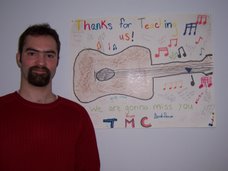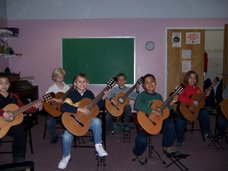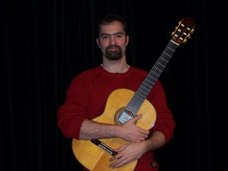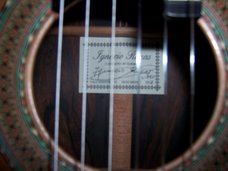Victor Villadangos is an Argentinean guitarist living and working in Buenos Aires. He is an excellent player with an extensive career having toured and played in many cities throughout South American, Europe, and North America. He is the professor of guitar at the Conservatorio Juan Jose Castro and Conservatorio Manuel de Falla de Buenos Aires. He also has an extensive discography having recorded five albums in his native Argentina. He has also, in the last few years, made three fantastic recordings for Naxos. These are Tango Argentino, Guitar Music of Argentina Volume 1, and Guitar Music of Argentina Volume 2.
Personally, I purchased Tango Argentio two years ago and was floored. I knew, as soon as I heard it, that I MUST play this music. I had never heard tango music like this played on the guitar and it was just amazing. Since then I have been in regular contact with Victor and have been lucky enough to receive several of his arrangements. I also searched the guitar world for other tango arrangements but none are nearly as good. Here is a Victor's website http://www.villadangos.com.ar/. You can also click on his link on the left hand side of the page. The following is an interview I conducted with Victor via email.
MCM: Could you give us a brief history of your start as a guitarist? Just hit the main areas, how you started who your first teacher was, stuff like this through your career and how you ended up in Buenos Aires.
VV: I started with private lessons at the age of 5, in Buenos Aires.
From 12 till 17 I was an electric guitar player and I performed in several bands.
After 17 I felt that I could become a classical guitar player. I entered the Conservatory “Juan José Castro” at that point.
María Herminia de Gomez Crespo was my teacher for 8 years.
MCM: So as a classical guitar teacher, could you talk a little more in depth about your early teaching experiences? Did you feel like you knew what you were doing when you first started? Did you have trouble keeping students? Did you lose students or gain them?
VV: I began teaching at a young age teaching popular music, so it was very natural for me. When I became a classical guitar teacher it was the same for me. I always had many students but I know pupils come and go….
MCM: What were some places like that you worked at?
I always worked at conservatories. First in my city of Buenos Aires, and then in other states such as Corrientes and Rio Negro. These are close to the desert area in Patagonia.
VV: So what was the straw that broke the camels back? When did you really feel that you had “made it?”
I never think, “I have made it.” I really feel it is the best I can do now, and I try to enjoy it because I love to be a musician.
MCM: During these early years were you able to perform as well? What were some factors that helped you find performances during your early career?
At the beginning, my teacher and the Conservatory helped me to find concerts.
Normally I performed at the conservatory hall, in churches, little halls, culture centers, etc.
MCM: Do you feel you benefited as a player through your teaching experience? How?
VV:No, I think the opposite. The fact of being a player gives me the exact points of trouble about the music I play. So then I think I can transmit the little secrets better to students.
MCM: If you could give young guitarists one or two tips on becoming a classical guitar teacher what would it be?
VV: First of all: go slowly. Each student has his own time.
The repertory has to be chosen correctly. It is very important for the students to play pieces in the correct level for them.
MCM: OK let’s talk a little about the politics of the classical guitar industry? Could you talk about the guitar world in Argentina?
VV: Each year we have less people interested in guitar concerts but more people who study the guitar.
It is very difficult for young people to insert themselves in the guitar circle.
MCM: I know that you are Professor of guitar at the Conservatorio Juan Jose Castro and Conservatorio Manuel De Falla de Buenos Aires how did you achieve these positions?
VV: I was a student at the conservatory Juan José Castro.
Just at the time that I graduated, the old teachers retired so the director of the conservatory chose the best students to replace them.
So then I begun to work as a teacher and later I won a contest which helped add stability to my positions.
MCM: As a professor you have had many students. From your position do you actively help former students and graduates to further your career?
VV: Yes. Sometimes I recommend them for teaching work and concerts and I try to connect them with people who organize concerts.
MCM: Do students ever just disappear of the map?
VV: Yes, is common the students works hard for a few years and the sometimes they disappear.
MCM: How do you feel when a young guitarist comes up to you unannounced and tries to “chat you up” or make a contact of you? Is it uncomfortable or are you happy to talk to these people.
VV: I have no problem to talk with new students and sometimes I give tips or give my scores or arrangements.
MCM: To wrap up what in your opinion are the most important things a young guitarist needs to do to put himself/herself in a position to further their careers through teaching and performing?
VV: First of all, a young student needs to be constant in their studying the guitar.
Talent is welcome, but more important is consistent study, not only repeating but thinking in his/her own way.





551 comments:
«Oldest ‹Older 1001 – 551 of 551Post a Comment